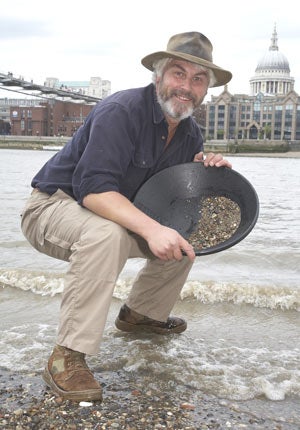Before the goldrush: British panning is thriving

Vince Thurkettle shakes his head sadly when he recalls the dark days when Britain's gold reserves were sold off. "We should all be crying in our beer over that one," he sighs.
This year, the price of gold reached $1,500 an ounce. A large chunk of the UK's reserves was sold off between 1999 and 2002 with dealers paying between $256 and $296 an ounce. The decision to sell almost 400 tons of bullion was made by the then Chancellor Gordon Brown when the price was at a 20-year low. Thurkettle, the country's only professional gold prospector, laments the lack of foresight.
"The world has become more unstable," he explains. "There are currency problems with the dollar and the euro, central banks have stopped selling gold, Eastern markets love it more than the West, and so as long as economies in China and India are thriving, then demand will remain huge."
The projection is that gold prices will rise even further as it becomes harder to find and extract. In times of turmoil, gold has always been the safe investment option and the world is in the grip of a new gold rush with modern-day prospectors heading to the gold-rich areas of Yukon, in Canada, and Alaska to seek their fortunes.
Most are men drawn by the thrill of adventure, although it is difficult to turn a profit. In Alaska, the fortunes of the prospectors are followed by the Discovery Channel documentary Gold Rush which shows the lengths prospectors go to, dredging for gold in the unforgiving Bering Sea.
A new gold mine may also be about to open in Britain. Although Scotgold Resources was last year refused permission to mine at Cononish in the Loch Lomond and the Trossachs National Park, it plans to submit a new application taking into account environmental concerns. If successful, the facility is expected to process 72,000 tons of rock and extract an estimated 20,000 ounces of gold a year.
The last UK gold rush occurred in Helmsdale, Scotland, in 1868 when Robert Gilchrist returned from Australia after working in the gold fields there for 17 years and began to pan in his local stream. He found gold and after his find was reported, between 400 and 600 prospectors descended on the area. Thurkettle, 55, from Norfolk, claims the number of modern-day hobbyists taking up gold prospecting has tripled since the recession.
"I've noticed an increase, I see more people out on rivers panning," he says. In 2004, he gave up a well-paid, secure job as a Forestry Commission deputy director to pursue his passion for gold. An expert in geology, he can spend days at a time in a wet suit, snorkelling along river beds, teasing flakes of gold from rocks with a butter knife – a method known as "sniping".
"It is a secretive business," he says. "Prospectors research thoroughly but they keep locations private for obvious reasons. You have to do your homework. I visit old town museums and look at their geological samples. But you can also get information listening to old men in pubs talking about where they've seen people panning. It is about research and old books."
Naturally occurring gold is mainly found in old rocks such as granite and carbon-rich shale. The UK's best gold-bearing rocks are in Scotland and North Wales, although deposits have also been uncovered in Devon limestone.
The modern-day gold rush is fuelled as much by interest in outdoor pursuits as it is by rising prices. "It is the same as going mountain-biking or fishing: it's harmless, delightful and ancient," explains Thurkettle. "For most, it is not about money. It's rare to find anything commercially viable on a hobbyist level. My biggest find in a day was worth about £1,500, but my worst is nothing. I've had lots of days like that."
"Gold Rush", 9pm, Tuesdays, Discovery
Join our commenting forum
Join thought-provoking conversations, follow other Independent readers and see their replies
Comments
Bookmark popover
Removed from bookmarks